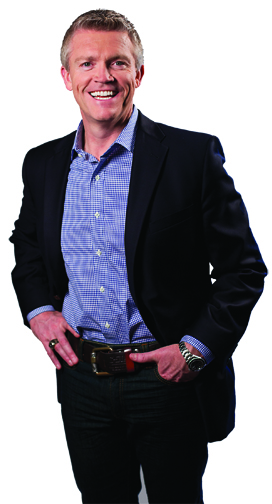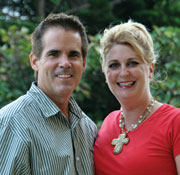
By Rez Gopez-Sindac
Joe Champion, Senior Pastor, Celebration Church, Austin, TX
Joe Champion leads Celebration Church in Austin, TX, with his wife, Lori. In October 2000, they held their first church gathering in a public library – after more than a year of praying that God would put them in a great city where they didn’t know anybody and where they could start a church from scratch.
 On the church’s first Sunday, there were 54 people in attendance, 50 of those were friends from New Orleans, LA, who came to support the launch.
On the church’s first Sunday, there were 54 people in attendance, 50 of those were friends from New Orleans, LA, who came to support the launch.
Today, Celebration Church is a thriving congregation of more than 7,000 people, with three campuses and a regional site in Mozambique, Africa.
The first few years were tough, Champion admits. “We did it the hard way – not the ARC way. I didn’t have a core of leaders. So much of what we did was by me, my wife and our kids. We broke all the child labor laws. We wouldn’t recommend it to anybody.”
ARC, or the Association of Related Churches, where Champion serves on the lead team, helps pastors successfully plan, launch and grow life-giving churches.
While on a layover at the Houston International Airport, Champion shared with Church Executive his thoughts on what Celebration is all about and what he makes of the media frenzy over football quarterback Tim Tebow’s visit.
Describe the early years of Celebration Church.
It was slow. Every week we had fewer and fewer people. At the end of our first year, we had 78 people; at the end of year two, we had 180 people; then at year three, we had 350 people. But going into our fourth year, things began to take off.
To what do you attribute the turnaround?
We made some adjustments in our services – the length, the style. We began to have a good core of leaders. We were able to get a respectful meeting place that made it look like we were going to be a real church.
Your wife is your co-pastor. Is this role by design from the get-go or did it happen gradually?
It was by design, but she has taken an even greater role in the church’s direction, vision and administration. She’s a fifth-generation preacher’s kid and has the gifts and calling to help lead our church. She leads a lot of staff meetings and ladies’ events, and she tag-teams with me to teach sometimes. In fact, we’re starting a brand-new ministry this fall called “Two Strong,” which will help gather pastors and their wives who are interested in knowing how to function together as a team.
Celebration Church not only has multiple locations in the greater Austin area, you also have a church plant in Mozambique, Africa.
That’s correct. We planted a church in Xai-Xai two years ago and now we have several locations in the Xai-Xai region. We have incredible leaders there – Mel and Diane Stauber. They’ve done a fantastic job assimilating into the community and culture. They absolutely love and understand Africa. We have seen other churches come and feed and then they leave, but we’ve set people to stay and live there. We feed almost 1,000 kids a day, and through the feeding outreach we establish the church.
How important is it to have a global presence?
We do not want to be a church that’s just reaching one neighborhood. We want to reach the nations. You start in your own Jerusalem but then you go to the ends of the earth. We feel like Xai-Xai is at the “ends of the earth.” Having an international church allows our people in the U.S. to develop relationships with the people of Xai-Xai. It allows our people to go on trips to adopt children, do feeding programs and partner with families.
What are the most  common challenges of leading a multisite church?
common challenges of leading a multisite church?
Finding the right leaders, duplicating the same DNA, getting people accustomed to video worship, and changing the mindset of the people. Having facilities that people know it’s not the mothership but it’s good enough. Having the same level of worship is a major challenge.
How do people at Celebration stay relational in such a big environment?
We have a monthly membership gathering; we emphasize assimilation in small groups; we hire relational pastors. Imparted into our DNA is the love for every person who walks through our doors. In that we are very intentional and part of our DNA is we would never become big in our own eyes.
How do you recruit and keep great leaders?
We have a growth track through membership. We have classes set up to help people discover their giftings and callings and find their place to serve. We find what people are passionate about and release them into ministry even if it’s outside the church. We talk a lot about how the church is like an airport. The airport is where you go to go to your destiny. Figuratively speaking, the local church screens you for weapons of mass destruction, knives, guns or liquids – anything that would bring your life down on a travel.
The local church is also a place that validates, just as you get a ticket at the airport validating you as a traveler. I believe God’s call on the church is to help people discover where they want to go and how can they get there. Some people have long layovers, some have short layovers.
That sounds counterproductive – releasing good people instead of keeping them.
Jesus said you lose if you try to keep, and you keep it if you’re willing to lose. We find that the more we try to get people away, the more they want to stay. We’re aware that we’re recruiting leaders in our messages – I’m always casting vision, creating opportunities for people to serve, and releasing people to birth their own ministries so they can walk in their God-given calling.
Do you hire from within or from the outside?
There are times where an expertise or experience is needed from someone who might have had a large-church experience. But as a rule we try to hire from within, or at least from our own DNA, our own family of churches and through other relationships.
Do you have a succession plan in place?
We have a plan in the event of an emergency, but I don’t have my successor designated. We’re creating a culture to birth the next generation of leaders. I agree, there is no success without a successor. It is our job to make sure we’re creating a healthy pipeline of leadership.
Celebration Church at tracted the media spotlight when Tim Tebow came to your Easter service. What were the immediate results of that event?
tracted the media spotlight when Tim Tebow came to your Easter service. What were the immediate results of that event?
On that day hundreds came to know the Lord. We also had quite an impact in the city. The organization of 1,200 volunteers that served on that day. The energy that our church received from knowing that what we were doing was being watched around the world. It allowed our church to see in the future that our property would be filled with a lot of people on a regular basis. The testimony that went out into the various media markets, even with the comedians the likes of Jay Leno, Jon Stewart and Stephen Colbert. It was a lot of fun to see how God just used that. But what I loved the most was the impact on our city and what it did for the volunteers in our church family.
—————————————————————————————————————
Church planting in a foreign culture
 When Celebration Church was looking for a pastor for their church plant in Xai-Xai (Mozambique, Africa), the person who was tasked to find the right fit was Mel Stauber, missions pastor at the time. But, as it turned out, Mel and his wife, Diane, were the right people for the job. In June 2010, the couple and their two kids left Texas – into a land where they didn’t know anyone, didn’t know the language, didn’t have transportation or a house. “We just landed with the sense that God was pleased with our obedience,” says Mel Stauber.
When Celebration Church was looking for a pastor for their church plant in Xai-Xai (Mozambique, Africa), the person who was tasked to find the right fit was Mel Stauber, missions pastor at the time. But, as it turned out, Mel and his wife, Diane, were the right people for the job. In June 2010, the couple and their two kids left Texas – into a land where they didn’t know anyone, didn’t know the language, didn’t have transportation or a house. “We just landed with the sense that God was pleased with our obedience,” says Mel Stauber.
Mel shares some of the joys and challenges of leading an outreach in Africa:
How church planting is different in Mozambique.
Though we want to make people comfortable, our building requirements are much less than those in the U.S. People are more relational and when they commit to the church, they are really committed. The pool of potential leaders is small. Many people lack strategic thinking skills and find it difficult to learn and try new things.
Everyday living takes much more time, leaving less time to spend with church development. Banking systems are cumbersome, often requiring long hours to handle the business side of church. We don’t rely so much on media and hi-tech devices.
On meeting the needs of the people in Xai-Xai.
We serve the community with projects such as road repair, house restorations and distribution of clothes, shoes, blankets and mosquito nets. Our partnership with Children’s Cup and Mission of Mercy allow us to care for 500+ orphaned and abandoned kids.
We provide preschool, Bible training, martial arts training, leadership training, music, and we are about to launch a program to teach kids how to sew and make souvenir artifacts to sell. We also have college funds for kids who will graduate from our program.
In the more rural area of Mavohane, we have a church campus and have recently started a school. This is the first school within four hours of walking distance for the people in that community. In about 12 years, we will see a child from Mavohane be the first to graduate from high school in that community’s entire history.
On the future of the church campuses in Mozambique.
I feel our assignment is to start 20 church campuses supporting 5,000 or more kids. In about 10 years, I hope to see the results of our work. When I see godly leaders emerge from all the church campuses and that those campuses are self-sustained and don’t need our continual support, I’ll know we have fulfilled our mission.



The people in the church are amazing. However, the moment you question the leaders or ask “why are we doing it this way” or “why are we promoting you instead of the church” you are quickly shunned and spoke negatively of. Place is great as long as you drink the coolaid and don’t question why they are putting in your mouth.